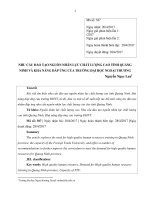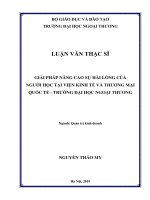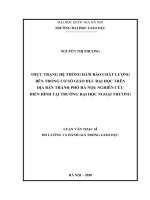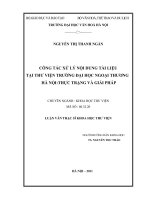BÁO CÁO NHÓM ĐẠI HỌC NGOẠI THƯƠNG JOT BUSINESS CHALLENGES AND RECOMMENDATIONS
Bạn đang xem bản rút gọn của tài liệu. Xem và tải ngay bản đầy đủ của tài liệu tại đây (207.14 KB, 17 trang )
1
D. TABLE OF CONTENTS
A.
INTRODUCTION ................................................................................................... 3
B.
LATE DELIVERY OF CHIRSTMAS PRODUCT .................................................... 4
CHALLENGE ......................................................................................................................... 4
RECOMMENDATIONS: ......................................................................................................... 5
C.
FAULT IN NEW SPACESHIP TOY ....................................................................... 6
CHALLENGE ......................................................................................................................... 6
RECOMMENDATIONS .......................................................................................................... 7
D.
NEAR – SHORING PROPOSAL IN VOLDANIA ................................................... 8
CHALLENGE ......................................................................................................................... 8
RECOMMENDATIONS .......................................................................................................... 8
D.
LAUNCH OF NEW RANGE TOYS FOR 9- 11 AGE GROUP: ............................ 10
BACKGROUND ....................................................................................................................10
PROPOSAL ANALYSIS ........................................................................................................10
SUITABILITY ASSESSMENT ..........................................................................................10
FEASIBILITY ASSESSMENT ..........................................................................................11
RECOMMENDATIONS .........................................................................................................11
E.
CONCLUSION ..................................................................................................... 12
F.
APPENDICES ..................................................................................................... 14
APPENDIX B ........................................................................................................................14
APPENDIX C ........................................................................................................................15
2
A. INTRODUCTION
JOT, established in 1998, is a company that produces electronic toys for Europe and
the USA market. By continuing to develop new product ranges, JOT positions itself as a
quality electronic toys producer in the industry. Currently, JOT has launched 5 new
products each year. JOT is a young company and it has planned to expand widely in
the future. In 2004, JOT started outsourcing all of its manufacturing to a wide range of
manufacturers in China. Consequently, JOT’s sales revenue exceeded €8 million by the
end of 2010, and the company had achieved substantial sales revenue growth each
year. JOT has seen its sales revenue grow by 16% in the year ended 31 December
2010 and by almost 18% in the year to 31 December 2011.
JOT has made a five-year plan that will aim at the following milestones by the end of
2016:
- Number of unit sales: 1,405,000 units.
- Number of countries products to be sold in: 36.
- Number of new products to be launched each year: 10.
- Revenue: €19,260,000.
- Gross profit: 33.6%.
The following SWOT analysis highlights key attributes and opportunities JOT should
leverage, threats to be mitigated and weaknesses to overcome.
Strengths
Weaknesses
Simple electronic toy.
Strongly depend on sales to large
retailers.
Mainly depend on loan finance.
Sophisticated
logistics
(JOT
manufacturer in China - warehouse in
EU & US - retailers over the world).
Focused on electronic & licensed toy.
Powerful brand name.
Well appealed toy features.
"Cutting edge" of the technology.
Large retailers and suppliers network.
Fast growth revenue.
Innovative in-house design team.
Opportunities
Threats
3
Fast growing market in electronic and
licensed toy.
Potential market in Asian and Russia.
More opportunities to reach a huge
world market.
Sales of toys are highly seasonal.
Sophistication
of
children
is
increasing all the time.
Unessential shipment expenses from
Asian manufacturer to JOT western
warehouses and ship back to Asian
retailers.
The most critical challenge is the late delivery for Christmas as it disrupts the delivery of
the product sold and damages relationships with regular main retailers and distributors.
Furthermore, JOT is urgent need of the goods to deliver to customers. It has more
severe financial consequences than fault in new spaceship toys, which is the second
most critical challenge as it can easily damage the reputation and image which JOT has
built for many years. A new outsourced manufacturer in Voldania will affect costs and
expenses in the long term. Finally, launching of new range toys for 9- 11 age group is
important, but not as pressing as the previous challenges.
E. LATE DELIVERY OF CHIRSTMAS PRODUCT
CHALLENGE
Gull which is one of JOT’s suppliers in China stated that it is unable to deliver goods to
JOT in the next three days as ordered. However, Gull said that it can supply JOT with
75% of the order (=1800 units) on time and the other 25% (=600 units) to be delivered
on 15 December (late 41 days) which is almost Christmas. This severe late delivery
has considerable financial consequences in the short term and in the long term damage
of JOT’s reputation.
This late delivery will cost approximately €8400 in revenues which is equal to 0.17 % of
sales value in quarter 4. This mistake can be worse since it is likely to happen again if
JOT continues trading with this outsourced manufacturer. The underlying reason can be
indicated from the rumor that Gull has been expanding rapidly and it is difficult for them
to complete the order. Moreover, this is the second time Gull has made this mistake;
therefore, we can suppose that Gull can easily dispatch goods lately again and JOT
does not pay much attention to the content of the contract with this outsourced
4
manufacturer. Suppose that this mistake repeats in the future, the table below illustrates
that the late delivery will cause predicted revenue loss in the next coming years:
Table: Predicted revenue loss of JOT from 2011 to 2016 (Currency unit: Euro)
2011
2012
2013
2014
2015
2016
8400
10029.46 11378.51 12823.8 14600.28 16698.42
The delivery crisis will have long term consequences, negatively affect JOT’s reputation.
Toys which arrive more than one month late could result in the weak consumption of
goods and disappointing customers’ expectation. Furthermore, it also breaks the long
lasting relationship between JOT and many retailers and distributors, which will affect
JOT’s revenue a lot. Therefore, going forward management should develop a course of
action to ensure the reliability and effectiveness of the delivery systems.
RECOMMENDATIONS:
To minimize the immediate loss both in sales revenue, JOT has three choices:
1. JOT will accept Gull’s offer which is deliver 75% on time and the other 25% in 15
December (41 days later). The goods received on time will be divided to main
buyers in Europe (Eurozone countries), Europe (non-Eurozone countries) and
the US. For one thing, we will not disappoint our customers much. The other 25%
will be sold later to get the money back as toys can be gradually consumed
without any defection.
2. JOT will receive 75% of the goods on time and refuse to receive the rest as it is
hard for retailers to sell the products when it is almost Christmas. The goods
received from Gull will be dispatched to main buyers in Europe and the US.
Besides, JOT could sue Gull for terminating the contract. However, the success
of legal action depends much on the contents of the contract and whether the
term for compensation is stated clearly or not. Failed legal action would be costly
and severely damage JOT’s relationship with Gull. In the meantime, JOT may
enter a short term delivery contract with an alternative distributor for some days
5
period. The source of distributor can be withdrawn easily from 20 off-shore
manufacturing companies in China as JOT has built a good business relationship
with these companies for a long time. In addition, a contract of 600 units (25%
contract) is not too big to be made up; therefore, JOT stands a golden chance of
fulfilling the order not too late.
3. JOT deserves the right to refuse the order and may sue Gull for terminating the
contract. However, this can easily damage the reputation and image of JOT
since it can not deliver the goods to its customers on time. The quantity and short
term contract prevent JOT from completing their duty to customers. Moreover, a
short term contract may attract premium. Another thing is that the time and cost
for suing will take JOT another sum of money which makes the situation worse.
Success in sue depends much on the contents of the contract and failed legal
action would be costly, cause negative media attention and damage JOT
reputation for a long time.
In the long term, JOT should look for another distributor replacing for Gull since late
delivery can repeat in the future due to the expansion of Gull and its incapability to fulfill
the order. These can be the other 19 outsourced manufacture companies in China
which JOT has trading with or the manufacturer in Voldania in Europe. However, the
bottom line here is that JOT should have clear terms and conditions in the contract in
order to run the business smoothly and avoid unexpected mistakes.
F. FAULT IN NEW SPACESHIP TOY
CHALLENGE
Recently, Jot’s flying spaceship toy, a newly launched product for 2012 Christmas
season, has been reported fault by a number of customers and consumers. The flying
spaceship toy was greeted well by retailers at first. Unfortunately, the insulation around
the electrical circuitry was designed to be sufficiently fire and heat resistant for only 2
hours recharging, and some consumers usually left the toy plugged in for longer than
the 2 hours required. Jot’s revenue is highly seasonal, and sales in quarter 4 accounts
to namely 50% of annual sales. Therefore, the problem will result in dramatically
declining profits and hurting Jot’s business relationship with its retailers in short term. In
6
long term, this will damage Jot’s reputation as a 'quality electronic toy' designer and
manufacturer.(Appendices B1)
Moreover, the largest toy fair in Hong Kong, which toy retailers all over the world, will be
on January. This is a chance to push up sales of new product. If the fault is not repaired
in time, Jot’s transparent cost will be beyond measurable figures. Thus, further actions
in both designing stage and sales policies should be made to improve the situation.
RECOMMENDATIONS
As JOT has sold out 7,200 units and the fault can be repaired for good, it should absorb
the temporary sales as well as reputation lost and continue to develop the flying
spaceship product line. The situation shows that JOT needs to enhance its product
development process before penetrating further to the Europe and competitive USA
market.
To minimize the immediate loss in sales revenue and reputation, JOT has three options:
1. Pay another 10€ for improving the flying space ship toy. JOT should also improve
some aspects of the toy such as: the color, the longevity of battery, special decorative
details…Then bring it to the January fair to be introduced as a second version of the
previous one. After that, JOT might contact its retailers and make update to second
version available for only a small amount of money - we recommend a fee of 6€ here.
JOT’s retailers would get 3€ for each updated product. Customers who have reported
will get a full refund for each. This solution seems to cost much, yet it could calm down
the retailers, customers, and save JOT’s reputation. (Appendix B2)
2. Alternatively, JOT could give another 10€ to improve the flying spaceship toy in
inventory, and give no concern to 7,200 sold out products. However, this solution will
heavily damage JOT’s business relationship with retailers and customers. Sales might
come down in the future. JOT’s reputation could also be heavily damaged.
3.The last option is for JOT to totally write off the product. The remained products in
inventory should be sold in the inferior market to minimize the cost. With this solution,
7
JOT give up its reputation, future sales and also opportunities to penetrate further to
competitive EU and USA market.
In long term, to make full use of competitive advantage in new product line, JOT has
two options:
1. Indy Kaplia is to be blamed for the mistake, however, he still have many radical new
designs to offer so JOT could keep him in. JOT could find another specialized company
for the manufacture and testing of the prototype products. With Indy new toys and a
more reliable testing company, JOT could avoid future problems and cost.
2. If the current testing company that JOT hires continues to make mistakes in testing
prototype products, JOT could consider creating its own testing department. However,
establishing a new department require much of financial capacity.
Thus, JOT could follow the first solution of both short term and long term recommended
solutions. These solutions are costly, yet they secure the market share, sales and
competitive advantages of the company.
G. NEAR – SHORING PROPOSAL IN VOLDANIA
CHALLENGE
With wage rate increases in China, some companies have started considering nearshoring, which means outsourcing the near country to save cost and JOT is one of
these companies. In the board meeting, JOT board’s members has been considering
near-shoring proposal in Voldania – a country in Eastern Europe. JOT wants to
outsource part of its manufacturing to Voldania, switching from China to Voldania. Tani
Grun, Finance and IT director of JOT had tried to investigate and find some valuable
information to this proposal. And we believe that this proposal should be accepted.
RECOMMENDATIONS
According to the financial information, there was a cost discrepancy between
manufacturing in China and Voldania (appendix C.5). This number shows that JOT will
increase their cost in the first year (€22600) but will save cost in next four years (€23000
in year 2, €61600 in year 3, €120600 in year 4 and €204600 in year 5). There is a huge
8
amount of saving money, we use a graph to illustrate how JOT saves their money by
showing a relationship between cost saving in five years and profit in year 2011.
Compare cost saving with profit in year
2011
300000
250000
200000
150000
100000
50000
0
-50000
Profit year
2011
Cost save
Y1
Cost save
Y2
Cost save
Y3
Cost save
Y4
Cost save
Y5
Otherwise, this proposal also has some risk and cost that we must consider more
carefully, such as:
2. The cost for changing manufacturer: JOT doesn’t know much about manufacturer in
Voldania, so JOT should have more investigation and find more information about
new manufacturer, such as:
a. Do products of manufacturer in Voldania have good quality?
b. Are they a good partner? (It means how they run their business, how
about their reputation?)
3. Environment in Voldania: this is a completely new country with JOT, so they should
consider carefully about their regulation and law.
4. JOT does not have much cash, they should have some solutions to finance in case
they need to pay, such as:
a. Borrow more over draft: The estimated increasing cost of the proposal is
€22600, approximately 4.52% of overdraft. Therefore, JOT still can handle
with it.
b. Push the customer to pay earlier to increase cash flow, on the other hands,
increase cash.
9
c. In its strategy, JOT is interested in expanding to Russia and Asia.
Therefore, JOT shows great favor in arranging the goods to be dispatched
directly from distributor to customers instead of delivering the goods back
to Europe to save cost. China indeed will be the ideal manufacturer for
JOT instead of Voldania.
D. LAUNCH OF NEW RANGE TOYS FOR 9- 11 AGE GROUP:
BACKGROUND
Alana Lotz (Product Development Director) suggested that JOT should develop a new
range of toys for the new market segment, 9-11 age groups. She proposed that JOT
should start with smart phone application. Alana strongly believed that it is a potential
market for JOT to take chance while Jon Grun (Managing Director) deeply suspected
the success of this risky plan.
PROPOSAL ANALYSIS
Evaluate information: Alana reached this idea through discussion in the previous toys
fair. Actually, this is not the largest and the most prestigious global toy fair which will be
well organized each January. Moreover, this toy fair just gathers toy manufacturing
companies, not the buyers. Hence, there are no persuasive evidences to conclude
about the further future trend of toy sales or customer demand as well.
SUITABILITY ASSESSMENT
JOT position: JOT's target consumers are 3-5 years old group and 5-8 years old group.
JOT has also built a powerful brand name with high quality electronic toys in these
target groups.
Market trend: Current toy market trend is towards electronic toys and computer
assisted learning. Obviously, JOT now catches the trend with inherent visible strong
point known as electronic features.
JOT has an own in-house design team which has no experience in creating a smart
phone application. Moreover, toys sold in the market to those children aged between 9
and 11 tend to be more sophisticated. However, JOT's design team is accustomed to
developing simple electronic products with basic movement, sound and light.
10
In this period, it is not suitable for JOT to pursue a new market with a brand new product
line.
FEASIBILITY ASSESSMENT
One of the biggest risks of this diversification proposal is that it would increase costs of
Research & Development, marketing, branding and manufacturing beyond budget. On
the other hand, JOT's marketing objective now is expanding its sales to new
geographical markets especially in Russia and Asia. In order to support this goal, JOT
certainly needs a considerable increase in the number of products of each model to
supply to these extensive markets.
As a small private company mainly depended on limited loan finance, JOT will be
unable to afford both market penetration strategy and diversification one. It needs more
large cash reserves.
RECOMMENDATIONS
Base on the above assessments, this proposal should be rejected due to a poor
business viability for JOT.
However, if JOT chooses to do this business, it is highly recommended to follow "Ansoff
matrix" as below from the lowest risk to the highest one to minimize the unexpected
events. Furthermore, it is vital to convince Alana to examine her plan carefully by these
formula steps to ensure the positive result of JOT's revenue. The first option mentioned
is already the marketing plan in near future of The JOT Toy Company.
Ansoff matrix
Existing product
New Product
Market penetration strategy
Product development strategy
Expand through existing products
in existing market (electronic and
Existing licensed toy for 3-5 and 5-8 age
market group)
Expand through new product in
existing market (new toy for 3-5 and 58 age group)
1. Toy modification via new features.
1. Enhance sales in Russia and 2. Support different quantity level
Asia - great potential market with
3. New toy line tends to be more
the largest children in the world.
11
2. Build up more business sophisticated.
relationships with manufacturers,
retailers and distributors.
3. More advertisings to attract
more buyers.
(I)
(III)
Market development strategy
New
market
Diversification strategy
Expand through existing product in Expand through new product in new
new market
(electronic and market.
licensed toy).
1. New toy line for children under 3
1. for under 3 years old group.
years old.
2. for 9-11 age group.
2. New and sophisticated toy line for
9-11 age groups.
(II)
(IV)
The lowest to the highest risk option: (I), (II), (III), (IV).
E. CONCLUSION
The current challenges faced by Jot pose a unique opportunity to establish a firm
foundation for sustained and profitable growth in the future.
It is critical that JOT
prioritizes a solution to the threat posed by the distribution crisis. The company should
accept Gull’s offer to receive 75% order on time and the other 25% later so as to
arrange the dispatch of goods to its customers. In the meantime, JOT should look for
another outsourced company among its off- shore outsourced manufacturers to ensure
that these problems will not happen in the future. In order to solve the problem of fault in
spaceship toy, JOT in short term should choose the solution focusing on its reputation
because Jot is a young company so it needs to strengthen its mutual benefit business
relationship with the retailers as well as the customers. In long term, Jot should build up
a strong team in designing to keep it a highly competitive company in the toy industry,
especially in designing new toys. The plan to change outsourced company to a near
shoring country namely Voldania can be a wise decision as to save a substantial
amount of money; however, JOT had better consider this issue carefully relating to
12
opportunity cost and other risks which JOT may face in the future. Finally, it is
recommended that JOT rejects the proposal of launching new range of toys for 9- 11
age group owing to the poor suitability and low feasibility. Nevertheless, in case JOT is
content to take up new challenge, it should take the Ansoff matrix into serious
consideration.
13
F. APPENDICES
APPENDIX B
APPENDIX B1
SalSes and profit lost due to fault in flying spaceship toy.
Inventory
Quantity
3,200
Price to retailers
€0
Original cost
€24
Profit per unit
€0
Sales lost
€0
Profit lost
€0
Capital lost
€76,800
Total
€76,800
APPENDIX B2
Cost evaluation for short term solutions.
Solution No.1:
Sold out
Repairing cost per unit
Update fee
Cost increase per unit
*Refund to reported customers
Total cost increase
Inventory
Price to retailers
Production cost
Repairing cost
Profit per unit
Total profit
Cost for solution No.1
€10
€ (3)
€7
€480
€50,880
€40
€24
€10
€6
€19,200
€31,680
Solution No.2:
Sold out
Repairing cost per unit
Update fee
Cost increase
Total cost increase
Inventory
Price to retailers
€0
€0
€0
€0
€40
14
€24
€10
€6
€19,200
€ (19,200)
Production cost
Repairing cost
Profit per unit
Total profit
Total cost for solution No.2
Solution No.3:
Sold out
Repairing cost per unit
Update fee
Cost increase
Total cost increase
Inventory
Price to retailers
Production cost
Repairing cost
Inferior price
Profit per unit
Total profit
Total cost for solution No.3
€0
€0
€0
€0
€40
€24
€0
€20
€ (4)
€ (12,800)
€12,800
APPENDIX C
Y1
Y2
Y3
Y4
Y5
1.75
1.96
2.20
2.46
2.75
Voldania 5.00
5.10
5.20
5.31
5.41
China
C.1 Labour rate per hour in 5 years
15
Y1
Y2
Y3
Y4
Y5
0.60
0.60
0.60
0.60
0.60
Voldania 0.45
0.45
0.45
0.45
0.45
China
C.2 Labour time per unit in 5 years
Y1
Y2
Y3
Y4
Y5
1.40
1.40
1.40
1.40
1.40
Voldania 1.96
1.96
1.96
1.96
1.96
China
C.3 Machine rate per unit in 5 years
Y1
Y2
Y3
Y4
Y5
3.00
3.18
3.37
3.57
3.79
Voldania 1.20
1.27
1.35
1.43
1.51
China
C.4 Distribution cost per unit in 5 years
16
Y1
Y2
Voldani
Y3
Voldani
Y4
Voldani
Y5
Voldani
China
a
China
a
China
a
China
a
China
Voldania
Labour cost
1.05
2.25
1.18
2.30
1.32
2.34
1.48
2.39
1.65
2.44
Machine cost
1.40
1.96
1.40
1.96
1.40
1.96
1.40
1.96
1.40
1.96
Distribution cost
3.00
1.20
3.18
1.27
3.37
1.35
3.57
1.43
3.79
1.51
Total cost per unit
5.45
5.41
5.76
5.53
6.09
5.65
6.45
5.78
6.84
5.91
Cost
per
unit
variances
Cost total variances
0.04 (F)
0.23(F)
0.44(F)
0.67(F)
0.93(F)
2400
23000
61600
120600
204600
(F)
(F)
(F)
(F)
(F)
22600
23000
61600
120600
204600
(A)
(F)
(F)
(F)
(F)
Fisrt year personal
donation
Total variances
-25000
C.5 Cost variances compare between Voldania and China in next 5 years
17









